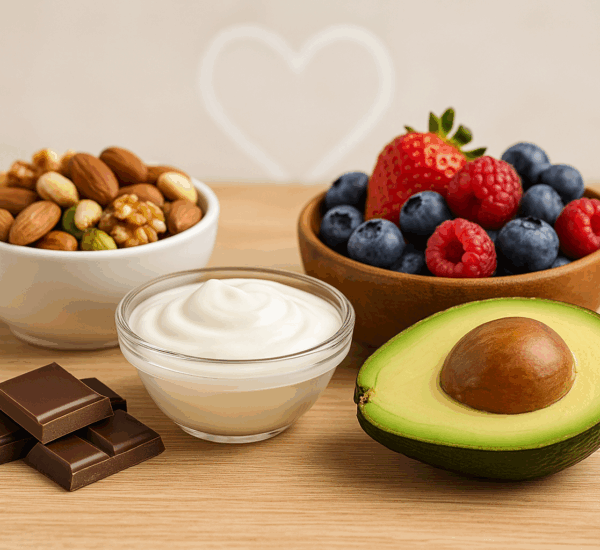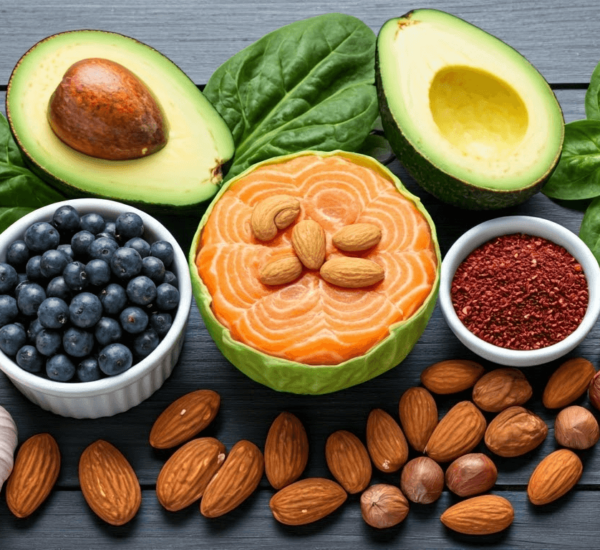7 Best Vitamins To UNCLOG Your ARTERIES
Key Highlights
- Maintaining heart health crucial for preventing the of heart disease.
- Vitamins play a vital in promoting heart health and maintaining healthy cholesterol levels.
- Certain vitamins help improve blood flow reduce the risk of plaque buildup in the arteries.
- Omega-3 fatty acids, magnesium, vitamin C, vitamin E, niacin (vitamin B3), and folate (vitamin B9) are some of the best vitamins for unclogging arteries.
- These vitamins offer various health benefits, such as reducing inflammation, improving blood pressure, and protecting against oxidative stress.
- Incorporating these vitamins into your diet can support a healthy cardiovascular system and promote clean arteries.
Introduction
The health of our arteries plays a crucial role in maintaining overall heart health. Arteries are responsible for carrying oxygen-rich blood throughout the body, nourishing all cells and tissues. However, over time, certain factors like unhealthy lifestyle habits and the natural aging process can compromise the health of our arteries, leading to the development of plaque buildup. This plaque buildup can narrow and stiffen the arteries, restricting blood flow and increasing the risk of heart disease. To keep our arteries clean and prevent this buildup, it is essential to incorporate specific vitamins into our diet.
In this blog, we will explore the 7 best vitamins that can unclog your arteries and promote heart health. These vitamins have been found to have numerous benefits for our cardiovascular system, including improving blood flow, reducing inflammation, and maintaining healthy cholesterol levels. By incorporating these vitamins into your diet, you can support a healthy cardiovascular system and reduce the risk of heart disease.
7 Essential Vitamins to Keep Your Arteries Free From Blockage
When it comes to maintaining healthy arteries, certain vitamins have been found to be particularly effective. These vitamins can help prevent the development of plaque buildup, reduce inflammation, and improve overall heart health. Here are the 7 essential vitamins that can keep your arteries free from blockage:
1. Vitamin K2
2. Omega-3 Fatty Acids
Omega-3 fatty acids play a crucial role in heart health by reducing inflammation, improving blood flow, and lowering the risk of heart disease. Studies suggest they can help lower triglycerides, decrease plaque buildup in arteries, and reduce the risk of atherosclerosis. Fatty fish like salmon and mackerel are excellent sources of omega-3s. Omega-3 supplements can also be beneficial, but it’s essential to consult with a healthcare provider before adding them to your regimen to ensure they complement your overall heart health plan.
3. Magnesium
Magnesium plays a crucial role in maintaining heart health by supporting proper muscle function and regulating blood pressure. Research suggests that adequate magnesium levels can help lower the risk of heart disease by reducing inflammation and promoting healthy blood flow. This essential mineral also helps in preventing the buildup of plaque in the arteries, thus contributing to overall cardiovascular health. Including magnesium-rich foods like leafy greens, nuts, seeds, and whole grains in your diet can help support arterial health and reduce the risk of plaque formation.
4. Vitamin C
Vitamin C plays a crucial role in artery health by acting as an antioxidant that combats oxidative stress and lowers the risk of atherosclerosis. It helps in the production of collagen, essential for maintaining the integrity of artery walls. Additionally, Vitamin C supports nitric oxide production, which aids in relaxing blood vessels, improving blood flow, and regulating blood pressure. Citrus fruits like oranges, strawberries, and kiwis are excellent natural sources of Vitamin C that can be easily incorporated into your diet.
5. Vitamin E
Vitamin E is a potent antioxidant that helps prevent oxidative stress and the buildup of plaque in the arteries. It plays a vital role in maintaining healthy arteries by reducing the risk of atherosclerosis. Foods rich in vitamin E, such as nuts, seeds, and leafy greens, are beneficial for heart health. Studies have shown that vitamin E supplementation can lower cholesterol levels and improve overall cardiovascular health. Including vitamin E in your diet can contribute to clean arteries and reduce the risk of heart disease.
6. Niacin (Vitamin B3)
Niacin, also known as Vitamin B3, plays a crucial role in promoting heart health by aiding in the reduction of cholesterol levels. It helps raise HDL cholesterol, the “good” type that benefits the cardiovascular system. By lowering triglycerides and LDL cholesterol, niacin contributes to cleaner arteries, thus reducing the risk of plaque buildup. This essential vitamin also helps in enhancing nitric oxide production, which supports healthy blood flow and arterial function. Niacin supplements can be beneficial, but it’s advisable to consult a healthcare provider before adding them to your routine.
7. Folate (Vitamin B9)
Folate, or Vitamin B9, plays a crucial role in arterial health by helping to regulate homocysteine levels, thus reducing the risk of atherosclerosis. Studies have shown that adequate folate intake is associated with lower levels of homocysteine, which is a significant risk factor for heart disease. Additionally, folate supports nitric oxide production, essential for maintaining healthy blood vessels and optimal blood flow. Including folate-rich foods like leafy greens, citrus fruits, and legumes in your diet can support clean and healthy arteries. Consider supplementing with Vitamin B9 for added cardiovascular benefits.
Understanding Arterial Health
Maintaining arterial health is crucial for overall cardiovascular health. Arteries are responsible for carrying oxygen-rich blood throughout the body, nourishing all cells and tissues. However, certain factors can compromise arterial health and increase the risk of plaque buildup. Understanding these factors can help us make informed decisions to promote arterial health. Here are some key points about understanding arterial health:
- Consuming white rice regularly has been associated with an increased risk of plaque buildup and cardiovascular disease.
- Lowering triglyceride levels can help improve arterial health and reduce the risk of atherosclerosis.
- Aged garlic extract has been found to have protective effects on arterial health and can help prevent the progression of atherosclerosis.
- Regular exercise plays a crucial role in maintaining arterial health by promoting healthy blood flow, reducing inflammation, and improving overall cardiovascular fitness.
By understanding the factors that affect arterial health and making lifestyle changes to address them, we can promote a healthy cardiovascular system and reduce the risk of heart disease.
What Causes Arterial Plaque?
The development of arterial plaque is influenced by various factors, including lifestyle habits, dietary choices, and underlying health conditions. Understanding what causes arterial plaque can help us make informed decisions to prevent its buildup. Here are some key points about the causes of arterial plaque:
- Niacin supplements can help reduce the risk of arterial plaque by improving blood lipid levels and reducing inflammation.
- Insulin resistance, a condition associated with diabetes and metabolic syndrome, can contribute to the development of arterial plaque.
- Adopting a healthy lifestyle, including a balanced diet and regular exercise, can help prevent the buildup of arterial plaque.
- Including fatty fish in your diet, such as salmon or mackerel, can provide omega-3 fatty acids that help reduce inflammation and promote arterial health.
By addressing these causes and making healthy choices, we can reduce the risk of arterial plaque and maintain a healthy cardiovascular system.
The Role of Inflammation in Arterial Health
Inflammation plays a significant role in the development and progression of arterial plaque. Chronic inflammation can damage the endothelial lining of the arteries, leading to the accumulation of plaque. Understanding the role of inflammation in arterial health can help us make informed decisions to prevent its harmful effects. Here are some key points about the role of inflammation in arterial health:
- Calcium supplements, especially when taken in high doses, can promote inflammation and contribute to the development of arterial plaque.
- Vitamin K and vitamin D play important roles in regulating inflammation and promoting arterial health.
- Chronic inflammation can contribute to the development of heart failure and other cardiovascular diseases.
- By managing inflammation through a healthy diet, regular exercise, and appropriate supplementation, we can promote arterial health and reduce the risk of plaque buildup.
By addressing inflammation and adopting anti-inflammatory strategies, we can support a healthy cardiovascular system and maintain clean arteries.
Lifestyle Tips for Healthy Arteries
Adopting a healthy lifestyle is essential for maintaining healthy arteries and preventing the buildup of plaque. By making simple changes to our daily habits, we can promote cardiovascular health and reduce the risk of heart disease. Here are some lifestyle tips for healthy arteries:
- Consult with a healthcare provider to assess your cardiovascular health and develop a personalized plan.
- Incorporate cardiovascular exercises, such as running or cycling, into your fitness routine.
- Consider taking fish oil supplements, which contain eicosapentaenoic acid (EPA) and docosahexaenoic acid (DHA) that support heart health.
- Avoid smoking and limit alcohol consumption to promote arterial health and reduce the risk of plaque buildup.
By implementing these lifestyle tips, we can support healthy arteries and maintain a strong cardiovascular system.
Dietary Changes for Arterial Health
Diet plays a crucial role in maintaining arterial health and preventing the buildup of plaque. By making dietary changes and incorporating heart-healthy foods into our meals, we can support a healthy cardiovascular system and reduce the risk of heart disease. Here are some key dietary changes for arterial health:
- Focus on a whole food, plant-based diet that includes fruits, vegetables, whole grains, legumes, and nuts.
- Limit the consumption of processed foods, refined sugars, and unhealthy fats that can contribute to chronic inflammation and plaque buildup.
- Include heart-healthy fats, such as avocados, olive oil, and fatty fish, in your diet to support cardiac health.
- Control portion sizes and practice mindful eating to prevent overeating and the buildup of plaque.
By making these dietary changes, we can support arterial health and reduce the risk of plaque buildup.
The Importance of Regular Exercise
Regular exercise is essential for maintaining arterial health and promoting overall cardiovascular fitness. By incorporating different forms of exercise into our routine, we can support healthy blood flow and reduce the risk of plaque buildup. Here are some key points about the importance of regular exercise:
- Exercise promotes the production of nitric oxide, a molecule that helps relax and widen blood vessels, improving blood flow.
- Regular exercise can reduce the risk of chest pain, known as angina, and other cardiovascular health problems.
- Engaging in aerobic exercises, such as jogging or swimming, helps maintain a healthy weight and improve cardiovascular fitness.
- Resistance training can help strengthen muscles and improve overall heart health.
By incorporating regular exercise into our daily routine, we can support arterial health, promote clean arteries, and reduce the risk of heart disease.
How to Incorporate These Vitamins into Your Diet
Incorporating vitamins into your diet is a great way to promote arterial health and maintain clean arteries. By including foods rich in these vitamins in your meals, you can support a healthy cardiovascular system and reduce the risk of plaque buildup. Here are some tips on how to incorporate these vitamins into your diet:
- Include vitamin C-rich foods like citrus fruits, strawberries, and bell peppers in your daily meals.
- Incorporate magnesium-rich foods such as leafy greens, nuts, and seeds into your diet.
- Consume vitamin E-rich foods like nuts, seeds, vegetable oils, and green leafy vegetables.
- Include niacin-rich foods like lean meats, poultry, fish, whole grains, and legumes.
- Incorporate folate-rich foods such as leafy greens, legumes, citrus fruits, and fortified grains.
By following a nutrient-rich diet that includes these vitamins, you can support a healthy cardiovascular system and maintain clean arteries.
Supplementing Wisely: What You Need to Know
While obtaining vitamins from food sources is ideal, sometimes supplementation may be necessary to ensure an adequate intake. When considering supplements, it is essential to do so wisely. Here are some key points to keep in mind when supplementing:
- Choose supplements that are natural and have been tested for quality and purity.
- Consider specific supplements that have been shown to have beneficial effects on arterial health, such as policosanol supplements.
- Consult with a healthcare provider before starting any supplements, especially if you have underlying health conditions or are taking medications.
- Monitor your insulin levels if you are considering supplements that may affect blood sugar levels.
- Remember that supplements should complement a healthy diet and lifestyle, not replace them.
By supplementing wisely and under the guidance of a healthcare provider, you can ensure a proper intake of vitamins and support arterial health.
Conclusion
In conclusion, maintaining arterial health is crucial for overall well-being. By incorporating essential vitamins like Omega-3 fatty acids, Magnesium, Vitamin C, Vitamin E, Niacin (Vitamin B3), and Folate (Vitamin B9) into your diet and adopting a healthy lifestyle, you can help keep your arteries free from blockage. Understanding the factors contributing to arterial plaque formation and inflammation is key. Make dietary changes, exercise regularly, and consult a healthcare professional for personalized advice on supplementing wisely. Prioritize your arterial health to promote a healthy cardiovascular system and enhance your quality of life.
Frequently Asked Questions
Can vitamins alone unclog arteries?
Vitamins alone cannot unclog arteries. While vitamins play a crucial role in supporting arterial health, they should be part of a comprehensive approach that includes a healthy diet, regular exercise, and lifestyle changes. These changes can help prevent plaque buildup and reduce the risk of heart disease.
How long does it take for these vitamins to improve arterial health?
The time it takes for these vitamins to improve arterial health can vary depending on individual factors and overall lifestyle. Consistently incorporating them into your diet, along with other heart-healthy habits, can lead to improvements in heart health and blood flow over time.
Are there any side effects of taking these vitamins?
While vitamins are generally safe when taken as recommended, it is important to consult with a healthcare provider before starting any supplements. Some vitamins, when taken in excess, can have side effects such as changes in blood pressure or high cholesterol levels. Your healthcare provider can help determine the appropriate dosage for you.
How can I tell if my arteries are getting healthier?
Monitoring certain risk factors and getting regular health check-ups can help determine if your arteries are getting healthier. Factors like blood pressure, cholesterol levels, and the overall health of your cardiovascular system can be indicators of arterial health. Your healthcare provider can perform tests and provide guidance based on your specific situation.
Can lifestyle changes reverse arterial damage?
Yes, making positive lifestyle changes can help reverse arterial damage and improve arterial health. Lowering blood pressure, reducing the risk of atherosclerosis, and addressing factors like oxidative stress and inflammation through lifestyle modifications can support the healing and repair of arterial walls.








